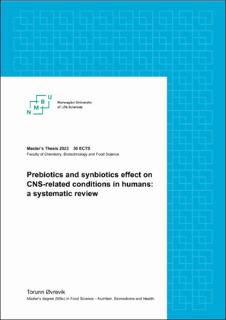| dc.description.abstract | The important role of the gut microbiota in human health is already well established, and researchers have grown an increased interest in this subject over the past years. Various studies have suggested that an altered composition of the gut microbiota is key to the modulation of the gut-brain-axis. One way to alter the composition of the gut microbiota is by intake of prebiotics and synbiotics. The role of prebiotics and synbiotics in communication between the gut and the brain, and the effect on mental health and cognition, has shown promising results in several animal studies. However, there is limited evidence for the prebiotic influence on the human brain.
In this thesis, a systematic search was conducted to investigate the evidence for prebiotics effect on neurological and psychiatric disorders. The search was conducted in the database PubMed in January 2023 with different combinations of the search terms: prebiotics, cognitive function, and RCT.
Prebiotic and synbiotic supplementation demonstrate a promising beneficial effect on mental health, especially anxiety and depression, and cognitive function in humans. This effect, however, seems to be influenced by various factors such as individual differences in gut microbiota, pathological state, and type, dose and length of intervention, to mention a few. Prebiotic and synbiotic supplementation may also lead to an improvement in metabolic and inflammatory biomarkers. These findings propose that prebiotic or synbiotic supplementation may influence their effects on mental health parameters. The composition of the gut microbiota also plays an important role in the bidirectional communication between the brain and the gut. It was not possible to explain the mechanisms behind prebiotics and synbiotics effect on the gut-brain-axis, as these mechanisms are not well established. Moreover, the type, dose, and duration of intervention necessary to provide a beneficial effect of prebiotic and synbiotic supplementation is still uncertain. Future research is therefore needed to investigate the potential use of prebiotics or synbiotics as therapeutical agents. | |
